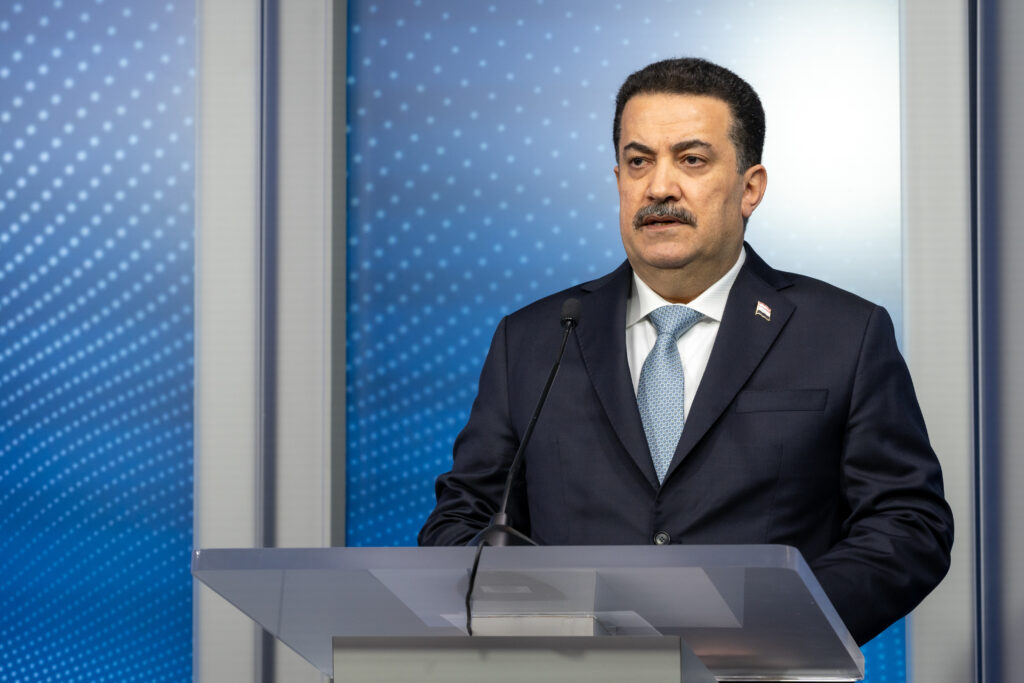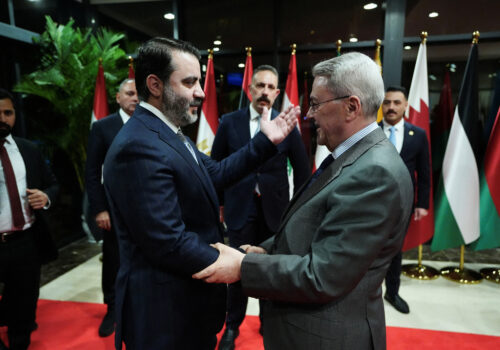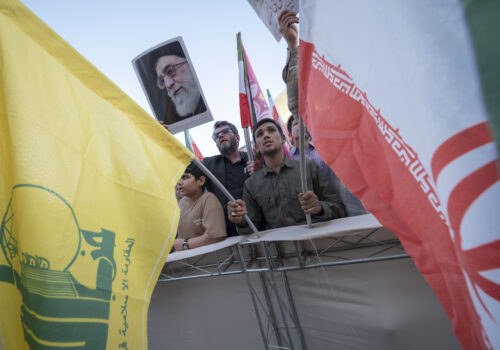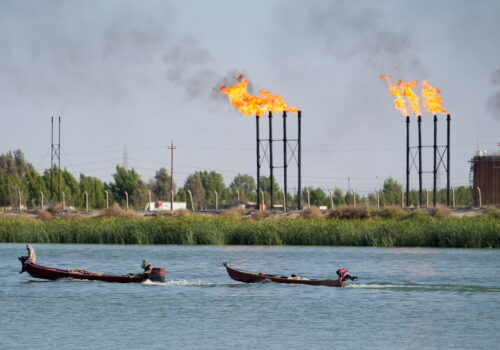Balancing acts and breaking points: Iraq’s US-Iran dilemma
Even without the current conflict between Israel and Iran, the prospects for future US-Iraq relations have often appeared dim.
Due in part to the reduced threat from the Islamic State in Iraq and al-Sham (ISIS), and also to public opposition to US military presence under Operation Inherent Resolve (OIR), Washington and Baghdad agreed to reduce the role of US forces in combating ISIS and transition to a new security relationship.
Moreover, Iran-backed militias had renewed attacks against US forces over Washington’s support for Israel’s military operations in Gaza in the aftermath of October 7, 2023. Making matters worse, popular expressions of anti-US sentiment, due to Iraqis’ long-held animosity towards Israel, led to attacks on US-linked businesses, limiting already low interest in expanding economic ties. Thus, with a diminishing security cooperation footprint and little room to expand into other sectors, it is difficult to envision where US-Iraq relations could go, except for termination or a status quo that does not adequately serve the interests of either party.
Appearances, however, can be deceiving. In April 2024, with the war in Gaza in full swing, Iraqi Prime Minister Mohamed Shia al-Sudani visited the United States to encourage improved security and economic cooperation. He even traveled to Houston, Texas, where he signed agreements with major US oil companies promising them preferential treatment, especially over Chinese companies that are looking to exploit Iraq’s oil resources. In addition to affirming his commitment to security cooperation with the United States, he also signed agreements with US defense contractors for training and equipment. Perhaps more importantly, he had already initiated a comprehensive security sector reform program that brings together all of Iraq’s security sector stakeholders, in which US advisors play a prominent role.
As a result of these conditions, US-Iraq relations appear to be at a crossroads. Baghdad could side with Tehran and expel the remaining US advisors, severely limiting, if not effectively ending, its relationship with the United States. It could also maintain its neutrality and perhaps play a role in de-escalating the conflict. However, there may also be an opportunity for the United States to facilitate Iraq’s efforts to reduce its economic and energy dependence on Iran, while building its resilience to Tehran’s disruption of Baghdad’s attempts at establishing full sovereignty.
The “dilemmas” of US-Iraq relations
Both the United States and Iraq have long had to balance their relations, with each other, with their respective relations with Iran. In Washington’s case, that balance entailed building closer relations with Iraq, while maintaining deterrence with Iran. For Iraq, that meant finding a balance between two partners in conflict, which required space for them to engage Baghdad without engaging each other. Not satisfied with separate corners, Iran has continually used its Iraqi proxies to limit the space in which the United States can engage, ultimately seeking to expel US forces and extend its control over the Iraqi government. In doing so, Tehran’s interference has disrupted Iraq’s recovery and stunted political reconciliation and economic growth.
The resulting “three-body problem” has generated dilemmas for both Iraq and the United States, where progress with one relationship undermines the other. Militia attacks on US forces, for example, place the United States in a position where it must choose between responding and generating public opposition to its presence or doing nothing, thus allowing Iran and its proxies to attack US troops with impunity. When the United States chooses to respond, the Iraqi government must then choose between sanctioning Washington in some way, risking valuable security assistance, or dealing with significant public backlash, often mobilized by the militias.
After the 2019 strikes against Iran-backed militias that had attacked US forces, killing one and wounding several others, for example, militias and pro-Iran political parties organized large protests that culminated in the storming of the US embassy. Under such conditions, the United States has only been able to engage Iraq where it has a comparative advantage, namely in the security and energy sectors.
Iran, for its part, may be the only party that does not face a dilemma in its relationship with either the United States or Iraq. Overtly interfering in Iraqi politics might invite protest, as it did in October 2019. That said, when nationalists associated with Iraqi cleric Muqtada al-Sadr won a majority of seats in parliament in 2021, the Iran-aligned Fatah movement was able to prevent government formation, leading al-Sadr to withdraw all his representatives from the legislature. This withdrawal left Fatah, a coalition of Iran-backed political parties, largely in control. This demonstrates the resilience of Iran’s influence in Iraq—and how Baghdad’s interests pose little threat to Tehran’s.
Despite this resilience, Iran’s inability to defend its airspace, its ongoing losses of key military leaders and nuclear scientists, and the threat of popular resistance have undoubtedly made Tehran feel a sense of urgency to disrupt US-Iraq engagement and convince Baghdad to abandon neutrality.
For example, pressure on Iraq from both Tehran and domestic sources could prompt an armed response to Israeli violations of Iraqi airspace. While the response would not likely be effective, it could prompt militias to overcome their current inertia and strike at Israeli and US targets, this time in defense of Iraqi sovereignty, which would garner much more political support than defending Iran. This could either pressure Baghdad into taking an even harder line toward Washington or face collapse, as parliament and the public question its legitimacy. Should Baghdad, for whatever reason, choose the harder line, the United States would have little choice but to abandon most, if not all, of its security cooperation programs, effectively ending the relationship.
Even if Baghdad resists Iranian pressure, renewed attacks by militias on US forces would again place the United States in a tit-for-tat exchange, a losing prospect for Washington. Each incremental strike or counter‑strike risks escalating a spiral of retaliation without gaining any strategic advantage. On the other hand, Iraq’s Iran-backed militias gain a strategic advantage simply by their challenge. Every provocation undermines US credibility, strains its relationship with Baghdad, and reinforces the militias’ narrative of resistance and legitimacy.
Resolving the dilemmas
Given the choices Baghdad faces, it is unlikely that it will choose to abandon its neutrality to support Iran against Israel.
While some Iran-linked militias, like Harakat Hezbollah al-Nujaba, have threatened to attack US persons and interests, they condition it on Washington or its allies “laying a single finger” on Iranian Supreme Leader Ayatollah Ali Khamenei. This is a common feature of militia public communications—allowing them to demonstrate opposition while assuming little risk of acting on it.
Despite the popular momentum around fighting Israel, militias may believe they have too much to lose from expanding the conflict. Not only could counterattacks by Israeli forces kill key leaders, but they could also disrupt lucrative oil smuggling operations that provide significant leverage with the Iraqi government. According to some estimates, Iran and its Iraqi proxies generate over one billion dollars per year in revenue, of which all get a cut. Oil smuggling is also not their only source of funds. In addition to embezzling from the Iraqi government, they have invested in the Iraqi economy, generating billions more in revenue. As a result, they now appear to be more focused on safeguarding these business interests than getting involved in a fight with Israel or the United States.
SIGN UP FOR THIS WEEK IN THE MIDEAST NEWSLETTER
The Iraqi government’s moves this year to have its militias to lay down their arms underscores this point. Iraq’s Minister of Foreign Affairs, Fuad Hussein, observed that this dialogue could not have happened two or three years ago; however, having militias operate outside the government is much less socially acceptable. He even offered that Iraq would like to mediate US-Iran tensions, similar to the role it played in normalizing relations between Saudi Arabia and Iran.
It is equally unlikely that Baghdad will move demonstrably closer to Washington, at least publicly. But, the discussion over the status of US troops in the region could present a window of opportunity for the relationship to progress.
The US had planned the withdrawal of its regional combat forces, while maintaining an advisory effort. But in the aftermath of the December ousting of Bashar al-Assad’s regime in Syria, Iraqi leaders have suggested that they would support the United States slowing down its military withdrawal.
Still, Iraq’s security interests and domestic politics likely preclude taking a position that supports the United States at the expense of Iran. While al-Sudani would likely invite expanded economic cooperation, as long as Israeli operations in Gaza and Lebanon continue, the security situation may remain prohibitive for significant Western, especially US, investment.
For now, this means that the best the United States can hope for is the pitch made from al-Sudani on his visit to Washington: continued security, and expanded energy cooperation.
To capitalize on this opportunity, Washington should continue its military advisory efforts and expand senior-level engagement in Iraq’s security sector. These efforts are wholly Iraqi-driven; however, as with most reform efforts, effective application requires political will, which US emphasis could bolster through engaging Iraq’s leaders.
Washington should also facilitate Iraq’s ongoing efforts to diversify its energy sources, thereby reducing its dependence on Tehran. Iraq has made deals with Turkmenistan, Qatar, and Oman for natural gas imports. French company TotalEnergies has agreed to invest ten billion dollars over a four-year period to develop natural gas resources and increase electricity generation capacity. Baghdad also signed an agreement permitting integration into the Gulf Cooperation Council’s electric grid, which could provide 3.94 terawatt-hours annually of electricity, or approximately 5 percent of Iraq’s annual consumption.
In fact, in a call with then US National Security Advisor Mike Waltz, al-Sudani reinforced Iraq’s interest in greater involvement by Western energy companies to facilitate energy independence. If Iraq were to become energy independent from Iran, the US would be in a position to remove the sanctions waiver allowing Iranian natural gas imports without posing hardship on the Iraqi people.
A complicated future
The future of US–Iraq relations is neither as dim as it may first appear, nor as promising as one might hope. Given the rapidly changing dynamics, the relationship will continue to be uncertain, contingent, and highly sensitive to regional developments. While Baghdad remains unwilling to openly align with Washington at the expense of Tehran, it has also shown restraint in responding to Iranian pressure and militia provocations, indicating a continued interest in maintaining a relationship with the United States.

Al-Sudani’s overtures suggest there is a strategic logic in preserving US engagement, particularly in areas where Washington retains a comparative advantage, such as defense cooperation and energy investment.
For its part, the United States must recognize that its influence will increasingly depend not on force posture but on its ability to support Iraq’s sovereignty, economic resilience, and institutional reform. Navigating this terrain requires a kind of constructive opportunism, where the United States has sufficient contact with Iraq to identify opportunities for expanding cooperation and the ability to quickly act on them. In this context, maintaining a quiet but durable partnership—anchored in mutual interests rather than grand ambitions—may be the most viable path forward.
C. Anthony Pfaff is a nonresident senior fellow with the Iraq Initiative in the Atlantic Council’s Middle East Programs and the research professor for the Military Profession and Ethic at the Strategic Studies Institute (SSI), US Army War College in Carlisle, PA. A retired Army colonel and Foreign Area Officer (FAO) for the Middle East and North Africa, Pfaff recently served as director for Iraq on the National Security Council staff.
Further reading
Wed, Jun 4, 2025
Why Iraq should build bridges with its ‘new’ neighbor, Syria
MENASource By
Iraq's position on the Syria transition is split between two camps: the official government, and that of the powerful non-state actors.
Tue, Jun 17, 2025
Why Hezbollah is unlikely to engage in the Israel-Iran war—for now
MENASource By David Daoud
As wave after wave of Israeli jets continue to strike Iran, Tehran's proxy on Israel’s northern border remains quiet.
Thu, Apr 3, 2025
Washington halted the Iraq-Iran electricity waiver. Here is how it’s perceived by Washington and Baghdad.
MENASource By Ahmed Tabaqchali, C. Anthony Pfaff
By making Iranian energy more costly, the United States hopes to incentivize Iraq to diversify its energy sources and reduce its dependency on Iran.
Image: Iraqi boys hold Iranian flags as they celebrate what they and other Iraqis celebrating say is Iran's victory, after U.S. President Donald Trump announced a ceasefire between Israel and Iran, in Baghdad, Iraq, June 24, 2025. REUTERS/Ahmed Saad


